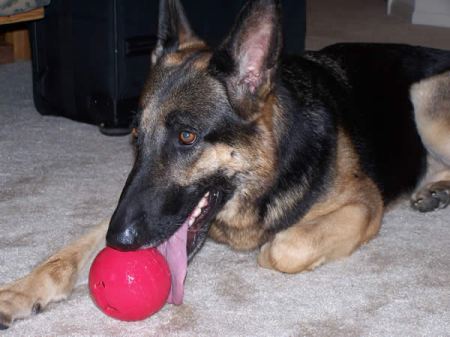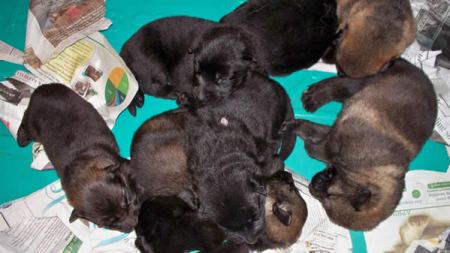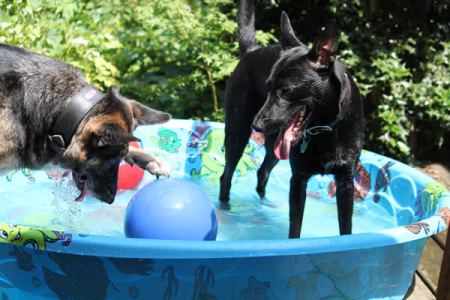What Dog is Right for Search and Rescue
Search and Rescue can be a wonderful and rewarding job for a dog. It is a challenge for both his physical body and his mind. Most of all, it is lots of fun.
How come most of the search dogs I see are of certain breeds?
Breeds found to work well for search and rescue typically come from sporting and herding groups.
An air scenting wilderness search and rescue dog is an elite athlete. He will need a body adapted to running in both the heat and cold for very long periods of time. He must also be able to expertly climb up, under, and across obstacles fearlessly. The canine must also respond to commands as well as have high intelligence and problem solving skills.
Dog breeds that most commonly fit these specifications include, but are not limited to:
German shepherds, American Labrador Retrievers, golden retrievers, bloodhounds, border collies, and Belgian Malinois. I have seen mixed breeds, huskies, poodles, Australian shepherds, cattle dogs, and springer spaniels successfully certify as well.
The breed isn’t everything.
While rescuing a dog from the animal shelter is a good and noble thing. It is also a commitment for the life of that dog. If the rescued dog does not work out for Search and Rescue, will you be willing to keep that dog?
Often the true personality of the dog may not reveal itself until many months after he has lived with you. Hidden medical conditions or behavioral problems caused by its breeding or past circumstances might arise that could end his working career, leaving you with a dog that needs a job and training.
Despite the risk, Shelters can often be a great place to find a good search dog. Dogs with too much energy tend to develop behavior problems such as barking, destruction, chewing, and digging if they are not kept busy. Most of the dogs surrendered are due to behavioral problems. If you are willing to brave the risks and can bring an expert along to help evaluate the dogs, go for it!
Say NO to pet stores.
Sadly, this is where many puppy mill dogs are sold. Puppy mills also have been caught selling their dogs by having people sell them out of their homes, posing as the original breeder and advertising in the newspaper. If you buy a dog that may have come from a puppy mill, you are not saving a dog, you are contributing to their bad business. If you do visit a breeder, ask for references, veterinary records, hip X-rays (for breeds prone to hip displaysia), and to meet the dam and sire if possible.
A note on papers from the AKC and other show dog organizations: While it is nice the paperwork proves the genetic line of a dog, it cannot prove the health, temperament, intelligence, working ability, or living conditions of the dog. Show dogs are bred for looks, not working ability. So, a dog from champion show lines does not in any way mean it will be a good working dog, too often the opposite tends to be true. The traits desirable in a working dog may be unintentionally bred out of the dog for looks instead.
Ok, so what am I supposed to look for?
Your best bet is to find a breeder who breeds dogs from working lines.
Look for a puppy with one or both of the parents is used for search and rescue, herding, bird dog, bomb or narcotics detection, schutzhund, agility, police, or military work. Your best bet is to meet with and talk to search and rescue groups in your area about the origins of their dogs. Meet with many breeders and dog handlers to get a feel for the different dogs out there. Training and living with a collie is a different experience than that of a lab and again different from a german shepherd.
The personality of the dog is also important.
Individual dogs have their own personality within a litter. A good search dog is very curious, independent, playful with human strangers, confident, sociable, able to maintain concentration, and obedient. A few puppy tests can be performed when observing the litter. A good search dog candidate will want to greet you when you approach, not shy in the corner. When separated from his litter mates, you will want a puppy curious with his surroundings. He should also love to play with humans. You can roll a ball past the puppy to see if he chases it or wave a rag around to see if he will chase it or play tug with you. Ask a search and rescue dog handler with experience in your breed of choice to help you pick out a puppy from a litter.
No matter what breed you decide to get or where it is from You will need a knowledgeable working dog handler to help you pick a dog with high drive.
Drive is the instincts that make dogs act the way they do. Prey drive is the eagerness to chase and catch and object or play tug of war. Food drive is the willingness to offer behavior in exchange for food.
A good working dog needs a drive high enough to work for hours without reward and the focus to ignore tempting distractions while working. The genetics of the dog determines the potential amount of drive the dog can manifest. Drive must be built with careful training before the dog matures. It’s a use it or lose it deal when they are young.
I already have a dog I want to train for SAR
The age of the dog is important
Consider, it takes two to three years to train and certify a dog for search and rescue. Most dogs retire at the age of ten years.
Your dog’s daily life affects his ability to do SAR
If your dog frequently gets to play with other dogs at home or at the dog park he will likely not be interested in working for you. Dogs consider other dogs more fun to play with than humans. Also, if your dog gets to play with your kids or other folks when ever he wants, he will unlikely be interested in working. He is already getting everything he wants for free.
Will you have the ability to arrange a quiet place for your dog to rest during the day without interruption? Will you be able to train your dog every day? Are you ready for something that will likely replace all of your other hobbies? If the answers are yes, then welcome to the search and rescue world! Join a search and rescue team to get started in rewarding world of k9 search and rescue.
A search dog does his job because he gets rewarded.
Searching is the best game your search and rescue dog will know. Oh, and its fun for humans too.
Contact your local Search and Rescue group to help you get started.
American Rescue Dog Association
UK- National Search and Rescue Dog Association
National SAR Organizations -(not maintained or represented by me, use at your own risk)



September 7, 2013 at 08:35
do they use golden retrievers
September 26, 2013 at 17:25
Absolutely. The goldens used in SAR are typically those bred specifically for hunting and are different than those bred as pets or show.
An excellent book about a golden search dog is “Scent of the Missing” by Susannah Charleson.
April 10, 2014 at 23:00
Hi, Im looking too get a dog I can use for search and rescue in Norway, and I’m thinking about getting a “Jack labrador” would translate too hunting labrador, or anyway labrador, looks little like black labrador. Would you think this is a good dog? my question is really, when you write “If your dog frequently gets to play with other dogs at home or at the dog park he will likely not be interested in working for you”, makes me wonder. I have a job where I work 2 weeks offshore, and then have 4 weeks off work onshore to train my dog. But these too weeks im away the dog would stay with my dad and his rhodesian richback, would this be too fun for him? meaning he will have problems succeeding as a rescue dog?
Hope you can help me,
Daniel
May 6, 2014 at 16:01
Daniel,
The lab sounds like it could be a good prospect. He must absolutely love to play with you and be very energetic. As for having your dog stay with your dad for the two weeks you are gone, this could be a problem during his formative first year. Have you found a team to join? It would be best to ask them to help you with your dog while you are away. Norway SAR folks out there, can you help this guy? My dogs go to a training kennel while I am away. They train my dog while I am away, so that when I get back, my dog is even better at his job than when I left.